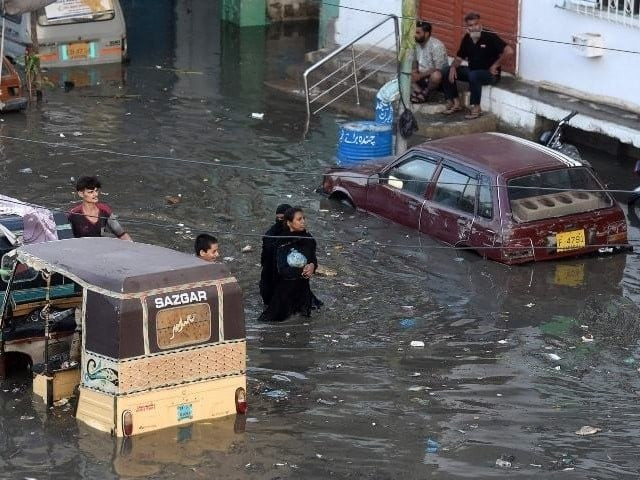Rain to lash ‘Karachi until Wednesday’
Three days on, water still standing in flooded areas of Surjani Town

Heavy rain, along with strong winds and lightning, will continue to lash Karachi until Wednesday, when the current spell of monsoon rains - the fifth this year - will begin to abate, a forecast issued by the Pakistan Meteorological Department said on Monday.
The PMD has warned that heavy downpour may cause urban flooding in some areas, predicting that the city may receive up to 100 millimetres (mm) of rain in a single day.
Meanwhile, Hyderabad, Thatta, Badin, Badin, Dadu, Shaheed Benazirabad, Tharparkar, Nagarparkar, Mirpurkhas, Islamkot, Umerkot, Sanghar and Larkana are also likely to witness heavy showers, as per the PMD forecast.
On Monday, Karachi continued to witness heavy downpours, preceded by gales blowing at 50 kilometres per hour. Gulshan-e-Hadeed, Malir and Kathore, in the port city's suburbs, were the first to be lashed by the rain, which later drenched much of the metropolis.
The highest amount of rainfall was recorded in Gulshan-e-Hadeed at 70mm, while Landhi witnessed 36.5mm of rain, the old airport 3.5mm, Jinnah Terminal 2.6mm, North Karachi 2.4mm, Masroor Base 2mm, Saadi Town 1.6mm, Gulistan-e-Johar 1.4mm and Surjani Town and Nazimabad 1mm each.
Meanwhile, Defence Housing Authority, Clifton, Baloch Colony, Bahadurabad, Tariq Road, MA Jinnah Road, Saddar and old city areas also received rain.
The maximum temperature on the day was recorded at 33.3 degrees Celsius and minimum at 29 degrees Celsius.
Unending ordeal
Meanwhile, the ordeal of the residents of Yousuf Goth, Sector 4B and Sector C of Surjani Town continued with no end in sight, as water standing up to five feet was not drained even three days after Friday's downpour left the area submerged.
With houses and streets inundated by water, there is fear of an outbreak of skin and gastrointestinal diseases. While many have already relocated, those left behind continue to suffer in misery.
Still hoping against hope that the missing government would come to their aid, the hapless residents continue to receive help from welfare organisations and the Pakistan Army.
According to Hamza Mobin, a scout from the University of Karachi, there is a shortage of potable water in the area and arrangements need to be made for its provision on an emergency basis.



















COMMENTS
Comments are moderated and generally will be posted if they are on-topic and not abusive.
For more information, please see our Comments FAQ